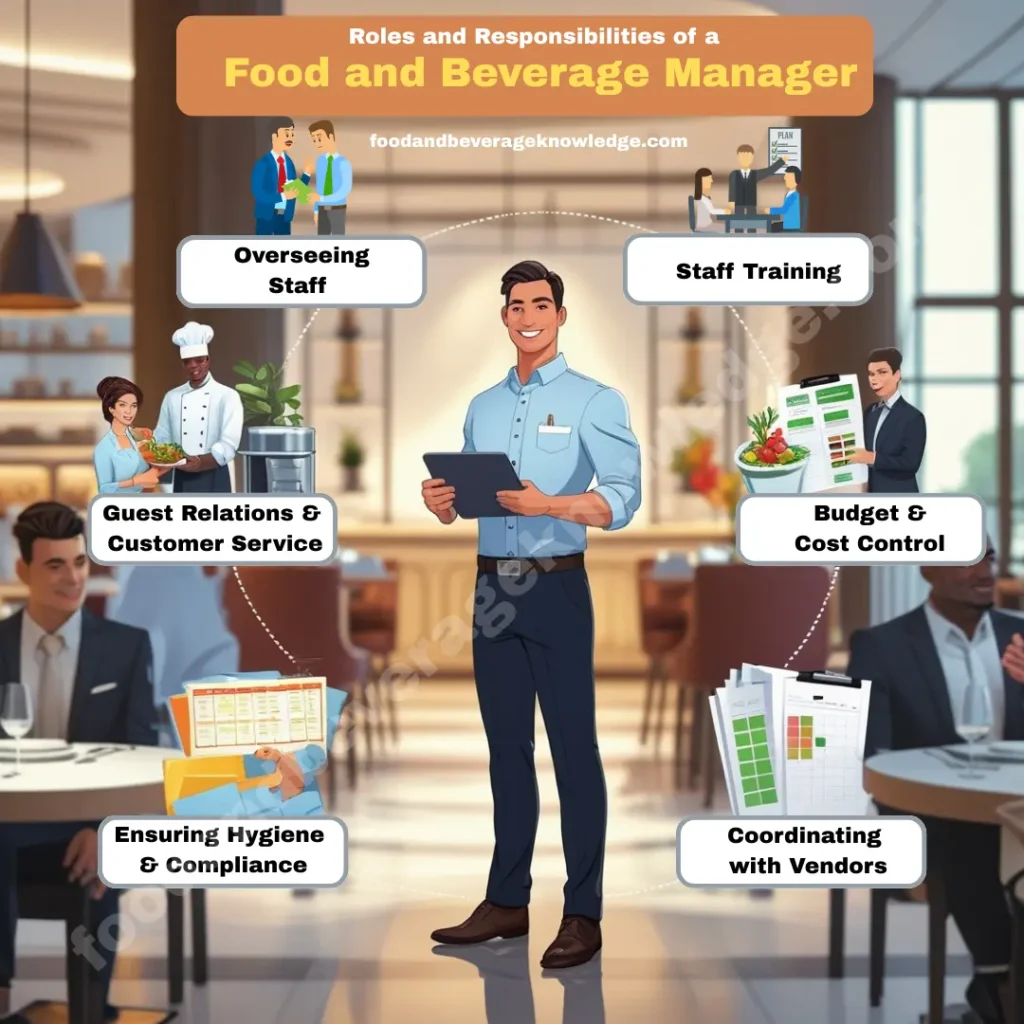In the dynamic world of hospitality, the Food and Beverage (F&B) Manager plays a pivotal role in ensuring seamless dining experiences. From overseeing daily operations to strategizing for profitability, their responsibilities are both diverse and critical.
What Does a Food and Beverage Manager Do?
An F&B Manager is responsible for the overall management of food and beverage operations within establishments such as hotels, restaurants, and resorts. Their primary goal is to deliver exceptional guest experiences while maintaining operational efficiency and profitability.
F&B Manager Responsibilities – Illustrated Guide

Key Responsibilities
1. Overseeing Daily Operations
F&B Managers supervise all aspects of food and beverage services, ensuring that operations run smoothly. This includes managing dining areas, bars, room service, and event catering.
2. Staff Management and Training
They are tasked with recruiting, training, and supervising staff to uphold service standards. Regular performance evaluations and ongoing training sessions are essential to maintain a competent team.
3. Menu Planning and Development
Collaborating with chefs and culinary teams, F&B Managers help design menus that cater to customer preferences and seasonal trends, ensuring both quality and profitability.
4. Inventory and Cost Control
They monitor inventory levels, manage supplier relationships, and implement cost-control measures to minimize waste and maximize efficiency.
5. Ensuring Compliance with Health and Safety Regulations
Maintaining high standards of hygiene and ensuring compliance with health and safety regulations is a critical aspect of the role. This includes regular inspections and staff training on safety protocols.
6. Customer Service Excellence
Addressing customer feedback and resolving complaints promptly is vital. F&B Managers strive to enhance guest satisfaction through attentive service and quality offerings. citeturn0search6
7. Financial Management
They are responsible for budgeting, forecasting, and financial reporting, ensuring that the food and beverage department meets its financial targets.
Related: Food and Beverage Service 101: The Basics, Types, and Roles Explained
Essential Skills and Qualifications
- Leadership and Communication: Effective team management and clear communication are crucial.
- Organizational Skills: Ability to multitask and manage various aspects of operations simultaneously.
- Financial Acumen: Understanding of budgeting, cost control, and financial reporting.
- Customer-Centric Approach: Commitment to delivering exceptional guest experiences.
- Knowledge of Industry Standards: Familiarity with health regulations and industry best practices.
Career Path and Opportunities
A career as an F&B Manager offers diverse opportunities in the hospitality industry. With experience, professionals can advance to roles such as Director of Food and Beverage or General Manager. Continuous learning and adaptability are key to success in this dynamic field.
By understanding the multifaceted role of a Food and Beverage Manager, aspiring professionals can better prepare for a rewarding career in hospitality. For more insights and industry updates, stay tuned to our blog.
Related:
- Duties and Responsibilities of Food and Beverage Service Staff: A Comprehensive Guide
- Top 16 Attributes of Food and Beverage Service Staff
- Food & Beverage service SOPs for Restaurant, IRD & Banquet
- Food and Beverage Service 101: The Basics, Types, and Roles Explained
Subscribe and join our community of hospitality professionals & students — get insights, tips, and the latest updates delivered straight to your inbox!







